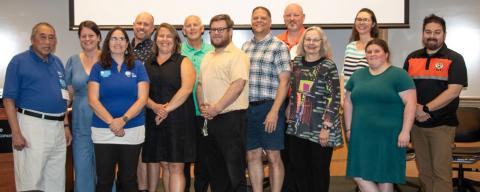Schoolyard SITES inspires students to explore the natural world in New Hampshire
In spring 2024, teachers and volunteers from across New Hampshire convened for another successful Schoolyard SITES showcase. The showcase provided space for teachers and volunteers to discuss their citizen science projects, expressing how it has impacted their teaching styles and their students in meaningful ways.
Schoolyard SITES is a professional development program funded by the National Science Foundation (grant # 1721133) and brought to New Hampshire schools by UNH Extension and the Leitzel Center.
The program pairs elementary school teachers and UNH Extension science volunteers to create a community-based professional development partnership that improves educators’ self-efficacy, science content knowledge and instructional practice. It brings new science teaching approaches to the classroom as teachers and volunteers explore, develop and implement citizen science projects that relate to New Hampshire’s natural world. The projects are aligned with Next Generation Science Standards (NGSS) in the schoolyard.
The teachers and volunteers who presented at the showcase carried out a range of interesting projects – from following energy in ecosystems to tracking marine debris at beaches to evaluating life cycles of trees in the woods.
A reoccurring theme shared by the participants was an appreciation for the opportunity to get the students outside of the classroom and engaged in “doing science.”
Third-grade Farmington teacher Brian Hall said, “In education, getting out into that environment usually is not the case when it comes to science. They will ship you a science kit full of sand from a beach or some skeletons from the shore, but it is a whole different experience when you are out in the field.”
Lynn Schweikart, a UNH Marine Docent volunteer, shared, “My goal was to get kids out in nature and understand the wonder of it all.” By allowing students to explore their immediate surroundings, the program expanded their understanding of science beyond the confines of a classroom, making lessons relevant and tangible.
When the students found out that their research was going to be used by “real scientists” they were blown away and were even more excited to learn. Mary Jones, a second and third-grade teacher in New Castle, shared that her students really took their beach cleanups seriously after hearing that they were part of research with the Blue Ocean Society. Data collected through their Marine Debris Tracker app is helpful to researchers and scientists who want to understand the presence and movement of marine debris. It’s also useful to town policymakers. Through three beach cleanups, students collected over 1000 pieces of debris.
Many of the students asked meaningful questions because they began to view themselves as part of a larger scientific community, realizing that their efforts can make a difference.
Anna Spalding, a kindergarten and first-grade teacher in New Castle shared, “This program really aligned with our desire to be better teachers. We wanted the kids to become invested in their community and become passionate about where they live, and we did that through this project.”
The Schoolyard SITES showcase highlighted the transformative power of science education when approached in a different and more engaging way. Through collaboration with UNH Extension volunteers, elementary teachers in New Hampshire have successfully introduced citizen science projects to their classrooms. These initiatives inspire students to see themselves as active members of the scientific community, fostering a lifelong passion for science.
